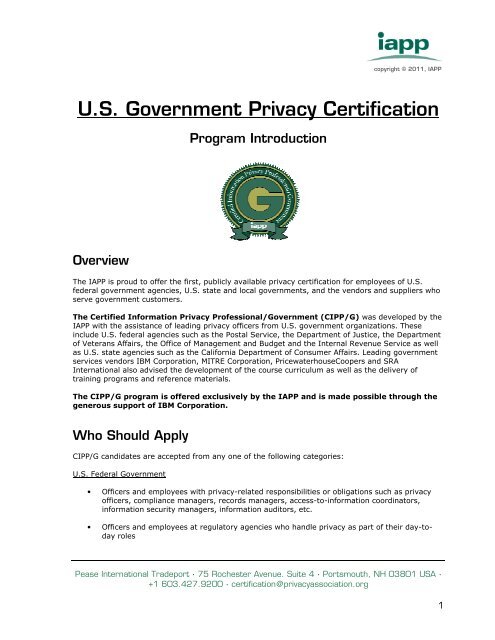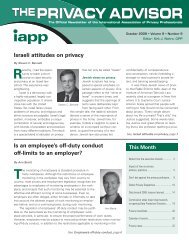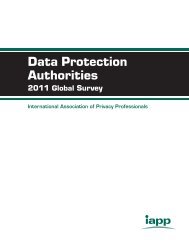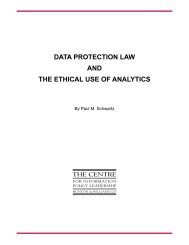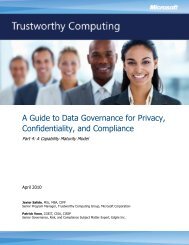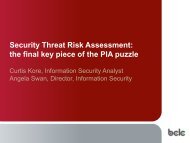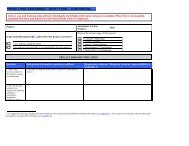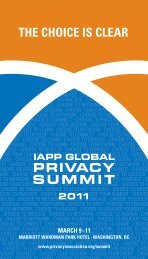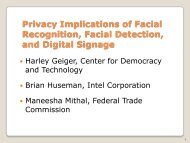U.S. Government Privacy Certification - International Association of ...
U.S. Government Privacy Certification - International Association of ...
U.S. Government Privacy Certification - International Association of ...
You also want an ePaper? Increase the reach of your titles
YUMPU automatically turns print PDFs into web optimized ePapers that Google loves.
copyright © 2011, IAPPU.S. <strong>Government</strong> <strong>Privacy</strong> <strong>Certification</strong>Program IntroductionOverviewThe IAPP is proud to <strong>of</strong>fer the first, publicly available privacy certification for employees <strong>of</strong> U.S.federal government agencies, U.S. state and local governments, and the vendors and suppliers whoserve government customers.The Certified Information <strong>Privacy</strong> Pr<strong>of</strong>essional/<strong>Government</strong> (CIPP/G) was developed by theIAPP with the assistance <strong>of</strong> leading privacy <strong>of</strong>ficers from U.S. government organizations. Theseinclude U.S. federal agencies such as the Postal Service, the Department <strong>of</strong> Justice, the Department<strong>of</strong> Veterans Affairs, the Office <strong>of</strong> Management and Budget and the Internal Revenue Service as wellas U.S. state agencies such as the California Department <strong>of</strong> Consumer Affairs. Leading governmentservices vendors IBM Corporation, MITRE Corporation, PricewaterhouseCoopers and SRA<strong>International</strong> also advised the development <strong>of</strong> the course curriculum as well as the delivery <strong>of</strong>training programs and reference materials.The CIPP/G program is <strong>of</strong>fered exclusively by the IAPP and is made possible through thegenerous support <strong>of</strong> IBM Corporation.Who Should ApplyCIPP/G candidates are accepted from any one <strong>of</strong> the following categories:U.S. Federal <strong>Government</strong>• Officers and employees with privacy-related responsibilities or obligations such as privacy<strong>of</strong>ficers, compliance managers, records managers, access-to-information coordinators,information security managers, information auditors, etc.• Officers and employees at regulatory agencies who handle privacy as part <strong>of</strong> their day-todayrolesPease <strong>International</strong> Tradeport ∙ 75 Rochester Avenue. Suite 4 ∙ Portsmouth, NH 03801 USA ∙+1 603.427.9200 ∙ certification@privacyassociation.org1
copyright © 2011, IAPP• Individuals who advise senior <strong>of</strong>ficers with government on information management policiesand practices specifically as these relate to personal information such as recordsmanagement or record retention• Information technology <strong>of</strong>ficers (CIO, CTO, CISO, IS manager)U.S. State and Local <strong>Government</strong>s• Officers and employees with privacy-related responsibilities or obligations such as privacy<strong>of</strong>ficers, compliance managers, records managers, access-to-information coordinators,information security managers, information auditors, etc.• Information technology <strong>of</strong>ficers (CIO, CTO, CISO, IS Manager)Private Sector Organizations• Attorneys, consultants, independent pr<strong>of</strong>essionals and/or employees <strong>of</strong> vendor companieswho serve clients in U.S. Federal, state or local governments• Existing Certified Information <strong>Privacy</strong> Pr<strong>of</strong>essionals (CIPPs) who wish to add a governmentprivacy specialization to their core credential.<strong>Certification</strong> RequirementsIn order to become certified in U.S. government privacy, candidates must complete and pass boththe IAPP <strong>Certification</strong> Foundation Examination and the CIPP/G Examination (<strong>of</strong>fered separately) for agrand total <strong>of</strong> three hours <strong>of</strong> testing. These examinations are <strong>of</strong>fered exclusively by the IAPP. Theyare administered on-site at select conferences and testing events that are held throughout theUnited States each year.• First-time candidates for IAPP privacy certification (e.g. individuals who do notpresently hold any IAPP certification) must activate an IAPP membership at any level inadvance <strong>of</strong> their test (special discounted rates for IAPP membership are available to U.S.government employees). Candidates must then pass both the <strong>Certification</strong> FoundationExamination, a two-hour, three-part, 120-item, objective test and the CIPP/G Examination,a one-hour, two-part, 60-item, objective test.• Existing IAPP-certified pr<strong>of</strong>essionals (e.g. individuals who presently hold a CIPP,CIPP/C, CIPP/E or CIPP/IT certification) are “grandfathered” into the Foundation testingrequirement but must still meet the CIPP/G testing requirement by passing the CIPP/GExamination, a one-hour, two-part, 60-item, objective test.“Successful completion” <strong>of</strong> CIPP/G is defined as an aggregate score <strong>of</strong> 70% or greater oneach exam (as applicable under each scenario above). This means at least 84 out <strong>of</strong> 120 total pointsfor <strong>Certification</strong> Foundation exam and at least 42 out <strong>of</strong> 60 total points for CIPP/G exam. Partialcompletion <strong>of</strong> either exam will result in no credential being awarded until such time that allrequirements are met. The exams may be taken in sequence at the same sitting or separately atdifferent testing events.Pease <strong>International</strong> Tradeport ∙ 75 Rochester Avenue. Suite 4 ∙ Portsmouth, NH 03801 USA ∙+1 603.427.9200 ∙ certification@privacyassociation.org2
copyright © 2011, IAPPUpon successful completion <strong>of</strong> both <strong>of</strong> the above referenced examinations, the CIPP/Gcertification becomes active on the date <strong>of</strong> the most recent examination and remains in forceannually provided that:(1) Once certified, the CIPP/G credential holder keeps the IAPP membership status current andin good standing each year; and,(2) Once certified, the CIPP/G credential holder also satisfies a minimum <strong>of</strong> 10 credit hours <strong>of</strong>continuing privacy education each year.Continuing privacy education (“CPE”) is defined as any program, event, forum, book,presentation, speaking engagement or teaching engagement that relates in whole to informationprivacy, security, auditing, risk management or legal compliance whether provided by the IAPP oranother sanctioning body. Specific guidelines on CPE-eligible programs and application processes areavailable for review under the “Continuing Education” section <strong>of</strong> the IAPP Web site atwww.privacyassociation.org.Course FormatThe pages that follow this program introduction describe the CIPP/G Common Body <strong>of</strong> Knowledge(“CBK”) in outline form. The course consists <strong>of</strong> two sections:I. U.S. <strong>Government</strong> <strong>Privacy</strong> LawsII. U.S. <strong>Government</strong> <strong>Privacy</strong> PracticesCBK Section I addresses privacy laws, regulations and policies –those specific to governmentpractice as well as those more broadly applicable to both the public and private sectors in the UnitedStates.CBK Section II describes government-standard practices for privacy program development andmanagement, privacy auditing and records management as well as reporting obligations andprogram controls.Course ReferencesTraining for CIPP/G certification is optional and available through the IAPP <strong>Certification</strong> FoundationTraining Workshop and the CIPP/G Training Workshop for a grand total <strong>of</strong> seven hours <strong>of</strong> instruction.Each <strong>of</strong> these courses is available for purchase online (as a CD-ROM courseware package) as well ason-site (as live classroom sessions at select IAPP conferences and partner events).Additional CIPP/G reference materials include:• All chapters from “U.S. <strong>Government</strong> <strong>Privacy</strong>: Essential Policies and Practices for <strong>Privacy</strong>Pr<strong>of</strong>essionals” by Julie McEwen, CIPP/G, CISSP and Dr. Stuart Shapiro, CIPP/G (IAPP,2008). ISBN #978-0-9795901-1-5.Pease <strong>International</strong> Tradeport ∙ 75 Rochester Avenue. Suite 4 ∙ Portsmouth, NH 03801 USA ∙+1 603.427.9200 ∙ certification@privacyassociation.org3
copyright © 2011, IAPPU.S. <strong>Government</strong> <strong>Privacy</strong> <strong>Certification</strong>Outline <strong>of</strong> the Common Body <strong>of</strong> Knowledge (“CBK”)for the Certified Information <strong>Privacy</strong> Pr<strong>of</strong>essional/U.S.Governmment (“CIPP/G”)I. U.S. <strong>Government</strong> <strong>Privacy</strong> LawsA. <strong>Privacy</strong> Definitions and Principlesa. <strong>Privacy</strong> Definitionsi. <strong>Privacy</strong> and personally identifiable information (PII)b. <strong>Privacy</strong> Basicsi. <strong>Privacy</strong> as a core value in U.S. government1. Confidence and trust2. Mission effectivenessii. <strong>Privacy</strong> incidents in U.S. government1. Federal agency data breaches2. State and local government data breachesc. Fair information practicesi. The U.S. Department <strong>of</strong> Housing Education and Welfare (“HEW”) Report<strong>of</strong> 1973B. U.S. Public and Private Sector Information <strong>Privacy</strong> Lawsa. Laws affecting both government and industryi. Health Insurance Portability and Accountability Act <strong>of</strong> 1998 (“HIPAA”)ii. Health Information Technology for Economic and Clinical Health Act <strong>of</strong>2009 (HITECH)iii. Children’s Online <strong>Privacy</strong> Protection Act <strong>of</strong> 2000 (“COPPA”)iv. Financial Services Modernization Act <strong>of</strong> 1999 (“Gramm-Leach-Bliley Act”or “GLBA”)Pease <strong>International</strong> Tradeport ∙ 75 Rochester Avenue. Suite 4 ∙ Portsmouth, NH 03801 USA ∙+1 603.427.9200 ∙ certification@privacyassociation.org4
copyright © 2011, IAPPb. Laws compelling the disclosure <strong>of</strong> personal datai. Bank Secrecy Act <strong>of</strong> 1970ii. Foreign Intelligence Surveillance Act <strong>of</strong> 1978 (“FISA”)iii. Right to Financial <strong>Privacy</strong> Act <strong>of</strong> 1978iv. Electronic Communications <strong>Privacy</strong> Act <strong>of</strong> 1986 (“ECPA”)v. Uniting and Strengthening America by Providing Appropriate ToolsRequired to Intercept and Obstruct Terrorism Act <strong>of</strong> 2001 (“USA-PATRIOT”)vi. The Real ID Act <strong>of</strong> 2005C. Information <strong>Privacy</strong> Laws for U.S. <strong>Government</strong> Practicea. The Freedom <strong>of</strong> Information Act <strong>of</strong> 1974 (“FOIA”)i. Publicly available information1. Regulationsii. FOIA requests1. Exemptions under the Act2. Exclusions under the Actb. The <strong>Privacy</strong> Act <strong>of</strong> 1974 (as amended)i. System <strong>of</strong> records1. Definition2. System <strong>of</strong> Records Notices (“SORN”)a. How definedb. Routine Usesc. Data management requirementsd. Data sharingi. Internallyii. Externallyiii. Accounting <strong>of</strong> disclosurese. Federal Register requirementsi. When triggeredii. Notice requirementsiii. Periodic reviewsiv. Noticesii. Exemptionsiii. Contractorsiv. Notice to individuals1. When required2. How implemented3. Contentc. The E-<strong>Government</strong> Act <strong>of</strong> 2002i. Website privacy policy (Section 208)1. Consent to collection and sharing2. Rights under other privacy lawsa. Requirements on agenciesb. Rights <strong>of</strong> individualsii. Modifications to prior OMB guidelines1. Notice options2. Machine-readable privacy policyPease <strong>International</strong> Tradeport ∙ 75 Rochester Avenue. Suite 4 ∙ Portsmouth, NH 03801 USA ∙+1 603.427.9200 ∙ certification@privacyassociation.org5
copyright © 2011, IAPPiii. Key Office <strong>of</strong> Management and Budget (“OMB”) Memoranda1. OMB M-03-22: Guidance for Implementing the <strong>Privacy</strong> Provisions<strong>of</strong> the E-<strong>Government</strong> Act2. Modifications under M-03-022a. OMB M-99-05: <strong>Privacy</strong> Responsibilitiesb. OMB M-99-18: <strong>Privacy</strong> Policies on Federal Web sitesc. OMB M-00-13: <strong>Privacy</strong> Policies and Data Collection onFederal Web sitesiv. <strong>Privacy</strong> Impact Assessments (“PIA”)1. When required2. Timing3. Content4. Exceptionsa. National security systemsb. Systems previously assessed under a PIAc. Internal government operationsd. Systems collecting non-PIIi. <strong>Government</strong> Websites5. PIAs versus SORNs6. Publication requirements7. Reporting requirements8. Relationship to The <strong>Privacy</strong> Act <strong>of</strong> 1974d. Consolidated Appropriations Act <strong>of</strong> 2005i. Chief <strong>Privacy</strong> Officer and Audit provisionse. The Data Quality Act <strong>of</strong> 2002i. OMB guidanceii. Agency requirementsiii. Administrative mechanismsiv. Periodic reportingf. The Federal Information Security Management Act <strong>of</strong> 2002 (“FISMA”)i. Federal agency responsibilities1. Agency program2. Agency reporting3. Performance programii. System vs. Enterprise compliance1. PIA versus security certification and accreditation (“C&A”)2. National Institute <strong>of</strong> Standards and Technology (“NIST”) riskmanagement frameworka. SP 800-122: Guide to Protecting the Confidentiality <strong>of</strong>Personally Identifiable Information (PII)iii. OMB reporting instructions for FISMAg. Requirements under Section 803 <strong>of</strong> the Implementing Recommendations <strong>of</strong> the9/11 Commission Act <strong>of</strong> 2007h. The Federal Agency Data Mining Reporting Act <strong>of</strong> 2007i. Federal open meetings lawsi. Federal Advisory Committee Act (“FACA”)ii. <strong>Government</strong> in the Sunshine Actj. Open <strong>Government</strong> Directivei. OMB M-10-06Pease <strong>International</strong> Tradeport ∙ 75 Rochester Avenue. Suite 4 ∙ Portsmouth, NH 03801 USA ∙+1 603.427.9200 ∙ certification@privacyassociation.org6
II.U.S. <strong>Government</strong> <strong>Privacy</strong> Practicescopyright © 2011, IAPPA. <strong>Privacy</strong> Program Management and Organizationa. Program developmenti. Program elementsb. Program managementi. FISMA modelc. Federal agency responsibilitiesi. Office <strong>of</strong> Management and Budget (“OMB”)1. OMB Circular A-130a. Assignment <strong>of</strong> responsibilities (Appendix 1)2. Reporting requirementsa. Biennial Matching Activity Reportb. New and Altered Systems <strong>of</strong> Records Reportc. New or Altered Matching Program Report3. Publication requirementsa. Publishing New or Altered Systems <strong>of</strong> Records Noticesand Exemption Rulesb. Publishing Matching Notices4. OMB Memoranda on protection <strong>of</strong> personally identifiableinformation (“PII”)a. M-07-16: Safeguarding Against and Responding To theBreach <strong>of</strong> Personally Identifiable Informationb. M-06-15: Safeguarding Personally IdentifiableInformationc. M-06-16: Protection <strong>of</strong> Sensitive Agency Information5. OMB Memoranda on data sharinga. M-11-02: Sharing Data while Protecting <strong>Privacy</strong>b. M-01-05: Guidance on Inter-agency Sharing <strong>of</strong> PersonalData – Protecting Personal <strong>Privacy</strong>c. M-04-26: Personal Use Policies and File SharingTechnologyd. U.S. Department <strong>of</strong> Homeland Security white papere. The President’s identity theft task force report6. OMB Memoranda on incident responsea. M-09-07: Recommendations for Identity Theft RelatedData Breach Notification Guidanceb. M-06-19: Reporting Incidents Involving PersonallyIdentifiable Information and Incorporating the Cost forSecurity in Agency Information Technology Investmentsc. M-07-16: Safeguarding Against and Responding To theBreach <strong>of</strong> Personally Identifiable Information7. OMB Memoranda on functional positions for privacya. M-05-08: Designation <strong>of</strong> Senior Agency Officials for<strong>Privacy</strong>8. OMB Memoranda on Websites & Website Measurement, SocialMediaa. M-10-22: Guidance for Online Use <strong>of</strong> Web Measurementand Customization Technologiesb. M-10-23: Guidance for Agency Use <strong>of</strong> Third-partyWebsites and ApplicationsPease <strong>International</strong> Tradeport ∙ 75 Rochester Avenue. Suite 4 ∙ Portsmouth, NH 03801 USA ∙+1 603.427.9200 ∙ certification@privacyassociation.org7
copyright © 2011, IAPPd. U.S. <strong>Government</strong> workforce managementi. Workforce hiring considerations1. Office <strong>of</strong> Personnel Management (“OPM”)2. Background screening and investigationsa. Levels <strong>of</strong> screeningb. Financial and medical recordsii. Office <strong>of</strong> Personnel Management (“OPM”)1. OPM Memorandum: Guidance on Protecting Federal EmployeeSocial Security Numbers and Combating Identity Theft (June 18,2007)e. <strong>Privacy</strong> policy enforcementi. Single or multiple policies for each agencyii. Sample approaches1. Census Bureau2. Internal Revenue Service (“IRS”)3. Department <strong>of</strong> Homeland Security (“DHS”)4. Department <strong>of</strong> Defense (“DoD”)B. Records Managementa. Management Processi. OMB Circular A-130b. Record retentionc. Inter-agency sharing <strong>of</strong> personal datai. M-01-05: Guidance on Inter-agency Sharing <strong>of</strong> Personal Data –Protecting Personal <strong>Privacy</strong>d. Personal use policies and “file sharing” technologyi. OMB M-04-16: S<strong>of</strong>tware Acquisitione. Common Rule for Protection <strong>of</strong> Human Subjectsi. Institutional review boards (“IRBs”)f. Disclosure <strong>of</strong> PII for statistical or research purposesi. Definition: government source to third partiesC. Auditing and Compliance Monitoringa. Auditingi. Pre-audit (e.g. “PIA”)ii. Post-audit (e.g. periodic review <strong>of</strong> disclosure audit trails)iii. Assessments vs. auditsb. Compliance monitoring and reportingi. Office <strong>of</strong> Management and Budget (“OMB”)ii. Inspector General (“IG”)iii. General Accounting Office (“GAO”)iv. Department <strong>of</strong> Justice (“DOJ”)v. Department <strong>of</strong> Health and Human Services(“HHR”)1. Office <strong>of</strong> Civil Rights (“OCR”)Pease <strong>International</strong> Tradeport ∙ 75 Rochester Avenue. Suite 4 ∙ Portsmouth, NH 03801 USA ∙+1 603.427.9200 ∙ certification@privacyassociation.org8


